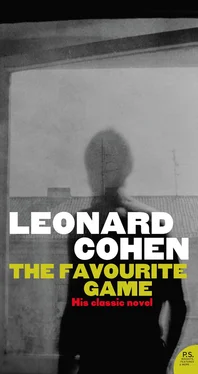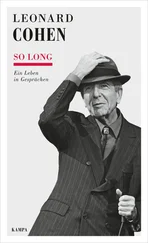LEONARD COHEN
THE FAVOURITE GAME

The Borough Press
An imprint of Harper Collins Publishers 1 London Bridge Street London SE1 9GF www.harpercollins.co.uk
First published in Great Britain by Martin Secker & Warburg Ltd., 1963
This edition published by Blue Door in 2009
Copyright © Leonard Cohen 1963
Leonard Cohen asserts the moral right to be identified as the author of this work
A catalogue record for this book is available from the British Library
This novel is entirely a work of fiction. The names, characters and incidents portrayed in it are the work of the author’s imagination. Any resemblance to actual persons, living or dead, events or localities is entirely coincidental.
All rights reserved under International and Pan-American Copyright Conventions. By payment of the required fees, you have been granted the non-exclusive, non-transferable right to access and read the text of this e-book on-screen. No part of this text may be reproduced, transmitted, down-loaded, decompiled, reverse engineered, or stored in or introduced into any information storage and retrieval system, in any form or by any means, whether electronic or mechanical, now known or hereinafter invented, without the express written permission of HarperCollins e-books.
Ebook Edition © JULY 2009 ISBN: 9780007341733
Version: 2015-10-29
This book is sold subject to the condition that it shall not, by way of trade or otherwise, be lent, re-sold, hired out or otherwise circulated without the publisher’s prior consent in any form of binding or cover other than that in which it is published and without a similar condition including this condition being imposed on the subsequent purchaser.
To my mother
As the mist leaves no scar
On the dark green hill,
So my body leaves no scar
On you, nor ever will.
When wind and hawl encounter,
What remains to keep?
So you and I encounter
Then turn, then fall to sleep.
As many nights endure
Without a moon or star.
So will we endure
When one is gone and far.
Cover Page
Title Page
Copyright
Dedication
Epigraph
Book I
Chapter 1
Chapter 2
Chapter 3
Chapter 4
Chapter 5
Chapter 6
Chapter 7
Chapter 8
Chapter 9
Chapter 10
Chapter 11
Chapter 12
Chapter 13
Chapter 14
Chapter 15
Chapter 16
Chapter 17
Chapter 18
Chapter 19
Chapter 20
Chapter 21
Chapter 22
Chapter 23
Chapter 24
Chapter 25
Chapter 26
Chapter 27
Book II
Chapter 1
Chapter 2
Chapter 3
Chapter 4
Chapter 5
Chapter 6
Chapter 7
Chapter 8
Chapter 9
Chapter 10
Chapter 11
Chapter 12
Chapter 13
Chapter 14
Chapter 15
Chapter 16
Chapter 17
Chapter 18
Chapter 19
Book III
Chapter 1
Chapter 2
Chapter 3
Chapter 4
Chapter 5
Chapter 6
Chapter 7
Chapter 8
Chapter 9
Chapter 10
Chapter 11
Chapter 12
Chapter 13
Chapter 14
Book IV
Chapter 1
Chapter 2
Chapter 3
Chapter 4
Chapter 5
Chapter 6
Chapter 7
Chapter 8
Chapter 9
Chapter 10
Chapter 11
Chapter 12
Chapter 13
Chapter 14
Chapter 15
Chapter 16
Chapter 17
Chapter 18
Chapter 19
Chapter 20
Chapter 21
Chapter 22
Chapter 23
Chapter 24
Chapter 25
Chapter 26
Chapter 27
Chapter 28
Chapter 29
Chapter 30
About the Author
Other Books By Leonard Cohen
Credits
About the Publisher
BOOK I
Breavman knows a girl named Shell whose ears were pierced so she could wear the long filigree earrings. The punctures festered and now she has a tiny scar in each earlobe. He discovered them behind her hair.
A bullet broke into the flesh of his father’s arm as he rose out of a trench. It comforts a man with coronary thrombosis to bear a wound taken in combat.
On the right temple Breavman has a scar which Krantz bestowed with a shovel. Trouble over a snowman. Krantz wanted to use clinkers as eyes. Breavman was and still is against the use of foreign materials in the decoration of snowmen. No woollen mufflers, hats, spectacles. In the same vein he does not approve of inserting carrots in the mouths of carved pumpkins or pinning on cucumber ears.
His mother regarded her whole body as a scar grown over some earlier perfection which she sought in mirrors and windows and hub-caps.
Children show scars like medals. Lovers use them as secrets to reveal. A scar is what happens when the word is made flesh.
It is easy to display a wound, the proud scars of combat. It is hard to show a pimple.
Breavman’s young mother hunted wrinkles with two hands and a magnifying mirror.
When she found one she consulted a fortress of oils and creams arrayed on a glass tray and she sighed. Without faith the wrinkle was anointed.
‘This isn’t my face, not my real face.’
‘Where is your real face, Mother?’
‘Look at me. Is this what I look like?’
‘Where is it, where’s your real face?’
‘I don’t know, in Russia, when I was a girl.’
He pulled the huge atlas out of the shelf and fell with it. He sifted pages like a goldminer until he found it, the whole of Russia, pale and vast. He kneeled over the distances until his eyes blurred and he made the lakes and rivers and names become an incredible face, dim and beautiful and easily lost.
The maid had to drag him to supper. A lady’s face floated over the silver and the food.
His father lived mostly in bed or a tent in the hospital. When he was up and walking he lied.
He took his cane without the silver band and led his son over Mount Royal. Here was the ancient crater. Two iron and stone cannon rested in the gentle grassy scoop which was once a pit of boiling lava. Breavman wanted to dwell on the violence.
‘We’ll come back here when I’m better.’
One lie.
Breavman learned to pat the noses of horses tethered beside the Chalet, how to offer them sugar cubes from a flat palm.
‘One day we’ll go riding.’
‘But you can hardly breathe.’
His father collapsed that evening over his map of flags on which he plotted the war, fumbling for the capsules to break and inhale.
Here is a movie filled with the bodies of his family.
His father aims the camera at his uncles, tall and serious, boutonnières in their dark lapels, who walk too close and enter into blurdom.
Their wives look formal and sad. His mother steps back, urging aunts to get into the picture. At the back of the screen her smile and shoulders go limp. She thinks she is out of focus.
Breavman stops the film to study her and her face is eaten by a spreading orange-rimmed stain as the film melts.
His grandmother sits in the shadows of the stone balcony and aunts present her with babies. A silver tea-set glows richly in early Technicolor.
His grandfather reviews a line of children but is stopped in the midst of an approving nod and ravaged by a technical orange flame.
Breavman is mutilating the film in his efforts at history.
Читать дальше












